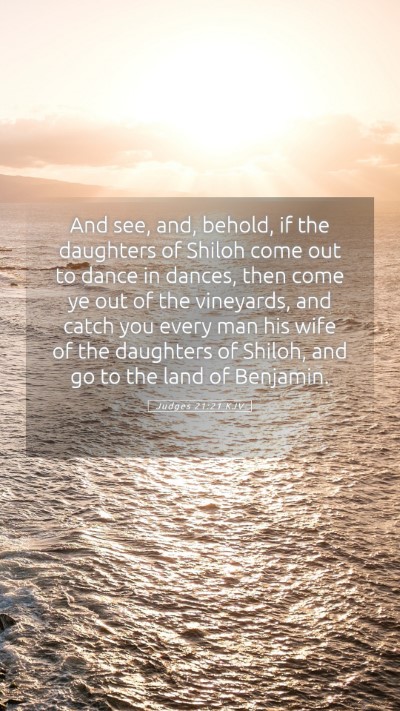Bible Verse Commentary on Judges 21:21
Judges 21:21 states: "And see, if the daughters of Shiloh come out to dance in the
dances, then come ye out of the vineyards, and catch you every man his wife of the
daughters of Shiloh, and go to the land of Benjamin." This verse is situated within
a narrative that illustrates the desperation and moral complexities faced by the
Israelites during the time of the judges.
Understanding Judges 21:21
In this passage, the Israelites concoct a plan to provide wives for the tribe of
Benjamin after a civil conflict that led to significant loss in their population.
The daughters of Shiloh would participate in a festival, and the males of Benjamin
were instructed to seize this opportunity to take wives, highlighting both their
dire need and the morally ambiguous context in which they operated.
Contextual Analysis
-
Moral Dilemma: The Israelites are shown engaging in
questionable practices to solve their societal issues, indicating a profound
moral decline during this era of judges. The act of forcibly taking wives
raises ethical questions regarding consent and autonomy.
-
Cultural Practices: This event reflects the cultural practices
of ancient Israel where marriages were often arranged and sometimes took
place through abduction, emphasizing the differing societal norms of the
biblical period compared to contemporary standards.
-
Divine Absence: The narrative proceeds without direct
references to God's guidance, suggesting a time when the Israelites acted
independently of divine instruction and reflects the cycle of obedience and
rebellion seen throughout the Book of Judges.
Commentary Insights from Renowned Scholars
Matthew Henry's Commentary
Matthew Henry discusses the tragic state of Israel, noting that the plan to
capture wives was born out of a regrettable necessity rather than divine sanction.
He reflects on the chaos that ensued from their lack of faith in God's providence
and the ramifications of their actions which further deviated from God's commandments.
Albert Barnes' Commentary
Albert Barnes highlights the situation as a desperate measure arising from
the inability of the Benjamites to find wives after the civil strife. He
emphasizes that such actions illustrate the moral challenges the Israelites faced
and the lengths they would go to secure their heritage, even in grievous ways.
Adam Clarke's Commentary
Adam Clarke provides insights on the social customs and ceremonies of Israel,
interpreting the act of capturing wives as reflective of the cultural norms of the
period. He points out that the act, while appearing dire, reveals deeper issues
about family, societal obligations, and the stress of maintaining tribal identity in
face of adversity.
Application to Modern Life
The perils faced by the Israelites in Judges 21:21 underscore the importance of
seeking God's will in decision-making. This passage challenges readers to reflect
on the morality of their own actions and decisions in times of desperation. As we
consider the implications of our choices, it is beneficial to weigh our decisions
against the teachings of Scripture to ensure alignment with God's will.
Cross References
- Deuteronomy 7:3-4 - Discusses the forbidden intermarriage with
surrounding nations.
- Judges 20:48 - Informs the preceding events leading to the
desolation of the tribe of Benjamin.
- Genesis 34:7 - Details another incident of forced marriage
and its consequences.
Conclusion
In summary, Judges 21:21 serves as a profound reminder of the ethical complexities
faced by the biblical Israelites. The verse encourages deeper biblical study and
understanding, while reinforcing the significance of seeking divine guidance in all
aspects of life. The insights from historical and cultural contexts provide a richer
understanding of scripture that can be applied to our lives today.


